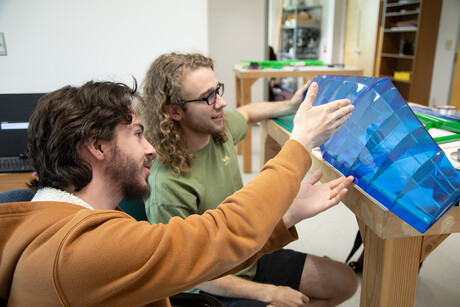I sat with 500 other people; people I had never met; people who I would not meet again; people who came from many various walks of life and cultures. So many different perspectives and experiences were represented.
There was a 90-year-old lady from Ukraine who had been ushered in by her granddaughter, sitting to my right. Scarf on her head, she needed assistance standing in order to raise her right hand and take the oath of citizenship. To my left, a slightly younger 60-year-old lady from Vietnam also took the oath. There was a Canadian man similar in age to myself who, like me, had fallen in love with an American citizen, and so he, too, stood and took the oath of citizenship.
Some shared their joy of now being able to travel with an American passport. Many articulated the ability to now vote. Others spoke of the opportunity that citizenship gave them — an ability to do more things in life. For others, it was the chance to live itself that they now had.
Citizenship — you don’t tend to think much about it until it’s something you don’t have, at least in my experience. As an Australian, it had never crossed my mind. And then I had a reason, a need, to live in a country that was not my own.
Becoming a citizen of the U.S. has made me reflect on my kingdom citizenship. Perhaps something that also can be taken for granted, particularly if one is “born with it.” Rahab was not born with it. In fact, Rahab was as far away from kingdom citizenship as one could get — on paper at least. Rahab was a Canaanite prostitute.
In the lineup of laws that defined one’s good standing as a citizen of God’s people, there were not many that she hadn’t crossed. She was a citizen of Jericho who, according to the writers of the Old Testament, was about to be destroyed by the hand of God — and “citizen” was probably a bit of a stretch. Even for those living in Jericho, prostitutes were not the poster children of good citizens.
It is an interesting story, both in its features and brevity. Two spies were sent in to scout out the city of Jericho while Joshua made plans to overthrow it. They slipped in and, of all the places they choose to stay, they stayed at Rahab the prostitute’s house. Smart. With all the men coming and going, they wouldn't have been noticed. They used her immoral rule-breaking for their good.
However, they were noticed. Pretty much straight away. The king sent guards, but she thwarted his attempts at arrest which sent them on a goose chase outside the walls while she hid the men on her roof. When it was safe, she sent them on their way with a special request: for them to show kindness to her family.
We do not know much about Rahab, but three things are clear:
- She was a prostitute — an occupation rarely chosen, no matter what time or place a woman is born into.
- She chose to hide the foreign spies rather than giving them up — either incredibly noble or dishonorable, depending on which angle you look at it. She betrayed her country, but she protected God’s spies. Or perhaps she was just astute — she read the times she was living in and knew the right ship to jump on.
- She sought to protect her family. For all the harshness of life that she had to endure and do to survive, at the end of the day, she sought to protect those she loved. So, she hung the red cord outside her window as instructed, and when the walls fell on that fateful day, her and her family were protected.
But that protection seems to put the camp in a bit of an awkward situation. In the lead up to taking Jericho, all the men were circumcised. There was a rallying of holiness, so to speak. What does one do with a foreign prostitute? The Bible says that Rahab and her family were given a place to live — outside the camp. She was, sadly, probably quite used to being an outsider. She was a woman of the night outside the world of the day — allowed to live, but not in any meaningful way. She was far enough away not to be a liability or discomfort to “respectable people.”
As humans, we seem to be challenged when it comes to making space for people we deem as outside our group. We can love everybody, as long as they stay in their allotted place — outside our camp. Because making space does come at a cost. Ways of doing things change, and our preferences are stretched. The comfortable autopilot of life usually needs to be switched to manual to accommodate people from outside our group. It is not easy.
Rahab saved the day for those spies — not only by saving their lives, but also by making a pivotal contribution to the victory of their nation — and the best they could do was give her a place outside the camp.
However, quite a few generations later, when the Word became flesh and lived among us, Rahab was given the pedigree of all pedigrees when it comes to citizenship — a place in the Messiah’s genealogy! No longer was she a foreigner living outside the camp; Jesus declared her family. And from my reading at least, it seems to be a theme of His ministry.
He spoke to His Israelite followers and said, “You are my family AND I need you to scoot over. Peter, move your chair closer to Andrew’s so that Rahab can fit. Paul, would you get up and grab those benches over there for the Philippians and Romans and Corinthians to have a seat? Philip, pull up a chair for the eunuch, so he doesn’t have to sit outside anymore. Mark, run outside and invite Mary and the other women in.”
He continues to speak to His followers today, calling us to scoot over, squish up, sometimes even physically get up and drag another bench over in order to make space at the table. And if for some reason you feel like you have never had a place, then this story is for you.
"Consequently, you are no longer foreigners and strangers, but fellow citizens with God’s people and also members of His household, built on the foundation of the apostles and prophets, with Christ Jesus Himself as the chief cornerstone. In Him the whole building is joined together and rises to become a holy temple in the Lord. And in Him you too are being built together to become a dwelling in which God lives by his Spirit" (Eph. 2:19–22).
The days of living outside the camp are over. If Rahab is given the ultimate seat, then there is a spot for you. Sit down, we will scoot over.







